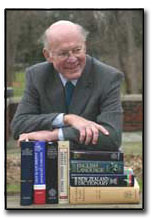
This web page is part of the Michigan Today Archive. To see this story in its original context, click here.
Talking about words: 'Prexy'With Professor Richard BaileyPerhaps nobody ever called James B. Angell "Prexy" to his face, but he was almost universally known as "the Prexy" during his long presidency of the University of Michigan. Prex was first the slangy name for a college president—there is documentation back to the 1820s—and then, at Yale, the slangy name got a diminutive and so prexy was born, and after that prez emerged and is still, to some extent, around. (The rappers "Dead Prez" are paying homage to the earlier '90s musical ensemble, "Dead Presidents.") Nostalgia is a recurrent theme in cultural reflections on English. The language was "better" when pairs like disinterested and uninterested were kept separate. It was a good time when educated people knew the difference between infer and imply . Nostalgia of this sort is often a little silly. In the mid-19th century, an essayist thought it was too bad that the good old ways were vanishing. Old-time English used lots of negatives in the same clause, and using lots of negatives—"The Russians have never had no right to no kind of passage through the Bosporus"—made things stronger, more forceful, and definite. Schoolteachers were enervating the language with persnickety rules! About the same time, another opinion-maker thought English had been destroyed by the Norman Conquerors who flooded a perfectly good Germanic language with a potpourri of words from a far inferior language. (That is, French.) So it would be a mistake to get too nostalgic over the fact that around the University of Michigan, nicknames are not what they were. Of course we have "Bo" Schembechler and "Red" Berenson and even "Lundo" (for the legendary Michigan athlete, Don Lund). But these familiar tags seem not nearly so vivid as Fielding H. "Hurry-Up" Yost. In May 1961, J. F. Lawton '11, a songwriter and insurance agent, was celebrated by the Regents for having written the book Hurry Up Yost in Story and Song. Lawton himself was, the Regents declared, known as "Mr. Michigan." Gerald R. "Flippum Back" Ford, the Michigan football center in the 1930s, later became the Prexy of the United States. Another Michigan undergraduate 40 years later had a much less flamboyant nickname: Madonna Louise Veronica Ciccone was known to her friends merely as "Nonnie." In the old days, faculty had nicknames too. Fred Newton Scott, the pioneering teacher of journalism a century ago, was known as "Fig" (< "Fig Newton"), and Professor H. H. Higbee of Mechanical Engineering suffered from the nickname "Horrible Harry." William D. Revelli, the famous director of the Michigan Marching Band, was called "Chief," and Hazel Marie Losh '24 PhD, our celebrated astronomy teacher, was "Doc." William R. Mann, the dean of the Dental School, spent so much time in Latin America that he was known among the students of his day as "the Invisible Mann." Nicknames, even the demeaning ones, arise and thrive when communities are close and knowledge of prominent people is widely shared. In the 21st-century megaversity, we have become "specialized" and not so well acquainted. So it's not surprising, perhaps, that the famous personalities on campus today seldom have well-known nicknames: Coaches Amaker, Carr and Hutchins seem not to have nicknames other than the ones they had when they arrived here. But that doesn't mean there aren't any nicknames. The U-M electronic directory enables participants to enter their formal names as well as various other names by which they might be known here and abroad. Here are some from the current directory: Chunky, Cranky, Dinky, Muffy,Pinky, Sleepy, Sooty (chosen to honor the user's cat), Spanky, Twinkie, Weezy, Wheezy. President Coleman has not yet listed among her array of names Prexy , and it's available. So nicknames may not be quite what they were. But they're still around.
|
|
Michigan Today News-e is a monthly electronic publication for alumni
and friends. |
| MToday NewsE | |||
|
Michigan Today
online alumni magazine
University Record
faculty & staff newspaper
MGoBlue
athletics
News Service
U-M news
Photo Services
U-M photography
University of Michigan
gateway
|
• Maps |
 Richard
W. Bailey is the Fred Newton Scott Collegiate Professor
of English. His most recent book is Rogue Scholar: The
Sinister Life and Celebrated Death of Edward H. Rulloff,
University of Michigan Press, 2003 - a biography of an American
thief, impostor, murderer and would-be philologist who lived from
1821 to1871. It was published by the
Richard
W. Bailey is the Fred Newton Scott Collegiate Professor
of English. His most recent book is Rogue Scholar: The
Sinister Life and Celebrated Death of Edward H. Rulloff,
University of Michigan Press, 2003 - a biography of an American
thief, impostor, murderer and would-be philologist who lived from
1821 to1871. It was published by the 